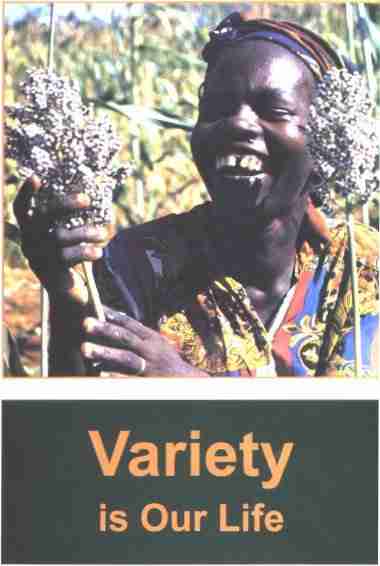| OPINION
Return to
top
Farmers' rights of access to, and benefit sharing from, the genetic
resources they develop and conserve and the conservation, protection and
sustainable use of Agricultural Biodiversity and productive agro-ecosystems
were advanced at GBF 15 and COP 5.
In the words of Tewolde Egziabher, the chief African Group negotiator,
who chaired the opening session of the GBF workshop "the pressure of
Africa and the majority of the South in the Seattle conference rooms and the
move for a fairer deal in the streets of Seattle started winds that unleashed
their erosive force" and not only biosafety but also the challenge to
patents on Life, the sustainable use of (agro-) ecosystems to ensure food and
livelihood security and the achievement of a fairer world are all a step
closer.
For the first time, farmers spoke at the GBF - Mishek Mutapwa from
Zimbabwe asked why it had taken so long for this to happen but was pleased that
the precedent had been set. The Chair of the GBF assured him that his comments
had been heard and that farmers would be included in future.
COP 5:
- Cemented the politicisation of the key issues on Access, including the
FAO International Undertaking; Biosafety, including liability and redress;
Participation of principal user groups and their institutions - Farmers,
Indigenous Peoples, Consumers - in open-ended working groups and as key
partners in programmes of work. These issues will not go away and more and more
countries are adding their voices to the clamour for sane policies that will
Sustain Life on Earth
- Heard Farmers' Voices and recognised their contribution to the
conservation and sustainable use of agricultural biodiversity and the
importance of agricultural biodiversity to their livelihoods and the other
multiple goods and services provided by the different levels and functions of
agricultural biodiversity; emphasised the importance of farmers' participation;
and recognised their need for incentives.
Main outcomes are significant improvements on Access and Benefit sharing
and a strong call for FAO to complete the International Undertaking
negotiations; inclusion in the ICCP agenda of liability and redress for any
negative outcomes of the use of GMOs including socio-economic and health
impacts; greater recognition of the need to recognise and provide incentives
for farmers' and local community contributions to development and conservation
of agricultural biodiversity; a clear call to GEF to give priority to funding
biosafety capacity building for the implementation of the Biosafety Protocol.
COP 5 did not ban Terminator Technologies nor 'Agent Green', but at least
did not accept that Terminator Technologies could form part of a system for
'contained use' of GMOs when released into the environment, as the Australians
(?US proxies?) would wish.
Another feature of this COP, which many commented 'had matured' and was
'more business like', was the attention given inside and out of formal sessions
to the pecuniary interests of stakeholders, groups and intermediaries (or their
proxies) who would wish to use the Convention, in the name of the poor and
environmental protection, to legitimise private commercial benefits from the
use of biodiversity or GMOs and/or legitimise the use of GEF funds for their
professional interests.
Return to
top
|
